#dany the last targaryen the last dragon destroying the iron throne and everything it represents with (dragon)fire
Explore tagged Tumblr posts
Text









#using a quote from some book you have not read is very bad and i have NOT read fevre dream but i will read it this year. just you wait.#anyway this fandom is sooo afraid of fire. weak. fire has always been a very flexible metaphor. fire is also rebirth#and like everyone calls the targaryens a gothic family so what better ending to their dynasty than#dany the last targaryen the last dragon destroying the iron throne and everything it represents with (dragon)fire#drafted that other post and got carried away so this is a companion piece#dany#*[🫀]#asoiaf
49 notes
·
View notes
Text
Joining the Game Late: S8E6 “The Iron Throne”
Synopsis
Tyrion surveys the damage and finds his siblings, while Jon almost fights Grey Worm over executions. Arya and Jon are in the crowd as Daenerys gives her victory speech and Tyrion gets arrested for throwing away his pin. Tyrion goads Jon into growing a spine; he sort of does. Daenerys lives out her Season 2 vision and expounds upon her philosophy of conquest before Jon stabs her (not like that) and Drogon burns the symbolism...but not Jon for some reason. A tense trial at the Dragonpit, with Edmure still being a dumbass and a bid for democracy from Sam that goes over poorly. The man on trial nominates Bran as the new king which everyone accepts because he monologued a good thesis statement for the show, except Sansa who makes the North independent. For their crimes Tyrion is still Hand, and Jon is sent back to the Night’s Watch. Grey Worm, his antagonism ignored, sails to Naath, while Arya sails west off the map and Brienne finishes Jaime’s entry. The new small council features Sam dropping the book series title, Bronn arguing over the necessity of rebuilding brothels, and Davos completing a very old brick joke. Jon comes home to Tormund, and the two of them and Ghost lead the Free Folk north of the Wall as Sansa and Arya join them via cuts for a Stark ending.
Commentary
There are parts of this ending that I like. I like that the episode concludes with the Starks; uninterested as I generally have been in the family as primary PoV characters, it’s thematically appropriately to close out on the ongoing adventures of Jon, Sansa, and Arya. I like that Jon/Tormund is less of a joke than I was expecting, that Tormund features prominently in Jon’s final scenes and that the show sends them off as a sort of family unit along with Ghost and the remaining Free Folk. I like Brienne’s addition to Jaime’s entry in the book of the Kingsguard, highlighting his heroism while also remaining honest about his final decision...and delicately leaving out the incest, or her own fling with the man for that matter. It’s sterilized, and yet not wholly so, a fitting way to end the story of such a morally complicated figure whose very existence in the narrative seems to hinge on a deconstruction of the knight in shining armor archetype. I like the realization of Dany’s vision at the end of Season 2, a tacit understanding by the showrunners that they (and GRRM advising them) knew they were eventually going to get to that image of the Iron Throne in a ruined Red Keep covered in snow. I like that the show doesn’t belabor the “where are they now” aspect of the epilogue, that not everything is perfect and tidily wrapped up even if most of what isn’t is left unmentioned offscreen. It reminds me very much of most Fire Emblem endings, in the sense that a true happy ending remains elusive and there are always challenges left to face and tales remaining to be told. This isn’t Lord of the Rings, concluding when a fat and allegedly relatable guy named Samwell plops down a book (for the most part not written by him) bearing the title of the work in-universe as if to say that that’s the end of that and everything will sort itself out, nor is it Harry Potter with its treacly epilogue pairing everyone off into neat heterosexual marriages with 2.5 children and middle-class comfort. The story will continue, and you can place bets on how many decades of peace Westeros will have before there’s another continental war and a bunch of these characters get violently offed like the generation before them.
There are parts of this ending that I can abide. I’ve reconciled myself to the indignity of Bronn taking Highgarden by seeing in him a type of character like Thénardier from Les Misérables. Both of them are amoral, avaricious assholes despite occasional entertaining moments, and despite that their stories reward them not only with survival but with wealth and notoriety far beyond what they deserve purely as a demonstration that life is often unfair like that. Perhaps Bronn’s lordship of the setting equivalent of Paris was an explicit nod to that? I don’t mind the council at the Dragonpit laughing outright at Sam’s suggestion - transparent as it was coming from the author’s self-insert - of elective democracy, because much like FE the pseudo-medieval stasis this setting is locked into is not realistically equipped to handle such a revolutionary political shift, much less competently depict it in around half an hour of remaining screentime. I can bear the overt allusions to fascist regimes in Daenerys’s victory speech scene, because if you’re going to pivot her from liberator with worrying violent tendencies to tyrannical conqueror hard enough to make it reasonably justifiable that the show’s two most prominent remaining “good” guys would conspire to assassinate her with only that one scene to do it in you may as well go all out with the shorthand. Drogon not roasting Jon is stupid, but melting the Iron Throne is a great symbolic image: destroying all the ruin and strife it represents, coming full circle with the Targaryen reign over Westeros, and so forth.
And then there’s one part of this ending that’s really hard for me to swallow, particularly as Fire Emblem: Three Houses presents a variation of the same scene with much better execution. As this episode aired only about three months before the release of FE16 the similarities between Daenerys’s death and the final cutscene of Azure Moon can be nothing more than an interesting coincidence, but as you’d be hard-pressed to argue that Edelgard did not take some design cues from Daenerys - and to a lesser extent Dimitri from Jon - during the game’s development it’s a useful coincidence for contrast purposes. I mentioned a few posts ago that most of the uncomfortable elements present in Dany’s death are absent in Edelgard’s; she and Dimitri are not sexually involved at any point, and the game focuses instead on their familial bond even though (ironically) they are not biologically related. Dimitri also kills Edelgard in self-defense, after he reaches out his hand to her and she responds by throwing a dagger at him - which is considerably less awful than Jon leading Daenerys into a kiss just so he can stab her. Three Houses also benefits in that Dimitri is a far better realized character overall than Jon Snow, with a clearly defined arc in Azure Moon, meaningful convictions that place him at odds with Edelgard on both a personal and philosophical level, and even a stronger queer angle - also with a bear belonging to a historically marginalized culture/ethnicity, humorously enough. Jon by contrast feels at this stage mostly formless, with nothing strongly defining him (barring perhaps his affection for the Free Folk, which is what he returns to when everything is said and done) and in fact a repeatedly reference lack of desire to do things. Little wonder then that his decision to kill Daenerys comes more or less entirely because Tyrion told him she was the final boss and had to be taken care of.
Regarding Dany herself...if you’ve been following this liveblog the whole way through you know that I’ve been watching her character since the show began for signs that she’d wind up where she does. Yes, they are there, quite in abundance actually, and where the show stumbles comes of course from how terrible paced the story is by the time it reaches her breaking point. The audience has to make do with some of the most obvious fascist signposting imaginable and a single nonsensical speech to Jon (something else she has in common with Edelgard incidentally, who has many of these) revealing Daenerys to be the egomaniacal conqueror she always was with no subtlety whatsoever because the show has run out of time for subtlety. To this episode’s credit I do appreciate that Grey Worm continues to stick around as a foil and reflection of Daenerys. His rage over Missandei’s death sees him executing captured Lannister soldiers en masse, and he continues to demand justice for Tyrion’s betrayal even though after this point the writers stopped caring about him and shipped him off to Naath for an ending (where I am told there are plague-bearing butterflies? That doesn’t bode well.). In Grey Worm one can see a version of Daenerys’s own anger at all that she has suffered and lost, and how destructive that anger can be - only Grey Worm doesn’t have a dragon that can charbroil a city in minutes. Still, these are mere scraps of characterization to set up such a drastic shift in presentation for one of the show’s two biggest leads, and I can definitely understand why fans were angry about it and probably still are. Even as someone who was expecting this all along and was never personally invested in Daenerys the way I was with some other characters, her death - the centerpiece of this episode, and the lead-in to GoT’s epilogue - was easily the biggest sour note of its finale, less that it happened at all and more how, and probably the single event in the last two-ish seasons that more than any other really needs the book series to flesh it out and develop it into something worthwhile.
I think that’s a wrap. I’ve spent nearly four months on this liveblog and have written far more than I possibly imagined that I would. Maybe sometime in a year or so I’ll return to this series again and just watch it through without taking notes. Perhaps I’m in a minority for believing that GoT would even be worth a rewatch. Eh...if you’ve read all this at least you know why.
11 notes
·
View notes
Text
Guys... I think I solved Game of Thrones
GOT Spoilers & Thoughts on Ending Ahead!!!
Read at your own discretion~
First off, I understand where people were coming from when they expressed disappointment toward the Night King's storyline having ended so quickly by a character not fitting the description of the prince/princess that was promised or Azor Ahai.
Arya Stark has been my favorite character since day one and I am extremely happy that she was the hero in the end of s8x03 (the story has been building up to her having this kind of moment since literally season one, but that’s a whole separate post).
However, I also fell in love with GOT for it's Shakespearean-esque style in terms of foreshadowing, symbolism, metaphors, etc. So I get why people feel they've been cheated for the past eight seasons with how things with the Night King ended. It didn't q u i t e fit the prophetic bill.
BUT (major spoiler theory coming your way)
Going along with the idea that Arya is not Azor Ahai, what if the Night King's sudden death shows us that he’s not the darkness explained in the prophecies after all?
Hear me out... If these theories are true, then the prophecies would still be relevant.
The Night King was born as a result of The First Men’s wrongdoings. They invaded Westeros, killed the children of the forest, cut down the sacred trees, and took the land for themselves. The Night King’s entire goal since then was to erase mankind altogether.
Under these circumstances, the Night King sure as hell comes across like the ultimate darkness exhibited in the prophecies. But we have three episodes left to show that he’s not, which begs the question:
what if the real darkness that the reincarnated Azor Ahai is supposed to defeat is the darkness brought on by mankind?
We’ve seen mankind’s evil tendencies, both big and small, throughout the whole show. A few examples: Robert Baratheon started a war, killing thousands of people, out of anger; Cersei killed hundreds of people so she could regain control, always stating that what she did, she did for her family (uncaring of what was good for the people); even Aegon Targaryen used his dragons to unite the seven kingdoms and create ultimate power for himself.
Everything that has happened, in some way or another, has been a direct result of the sins, the darkness, of man.
Now comes the final battle. We all thought it would be against the Night King because we’ve spent the last eight seasons thinking he was the darkness that was prophesied (yes it’s a word). But going by the logic mentioned above, he and the army of the dead were just parts, just results, of the darkness. Not all of it.
What if the iron throne, which represents mankind and its ceaseless transgressions, is the ultimate evil? What if the only way to defeat the darkness is to usurp/kill Cersei and break the wheel?
There’s been a lot of talk about breaking “the wheel” in later seasons. Much like the Night King, the wheel was created from mankind’s sins, representing all the times men have fought and killed for power. Failing to break it would result in a long night line of corrupt or unfit rulers like Cersei and basically every king before her.
I don’t know for sure how how the wheel will be broken, but I feel like it has something to do with destroying the throne. If the darkness does stem from mankind and not the Night King, wouldn’t eliminating the monarchy help prevent history from repeating itself?
In any case, it’s certainly is interesting to view Death as not being the greatest evil after all. Mankind is, and has always been, its own greatest downfall.
Additional thoughts:
- Remember folks, since they’ve been beating it into our systems this whole time: e v e r y t h i n g h a p p e n s f o r a r e a s o n
- If killing mankind was the Night King’s goal, it makes sense that he, the god of Death, would want to kill the Three-Eyed Raven first–doing so would not only break the wheel, but make it so a new one would never be created again, thus taking away all chances for history to repeat itself
- All of this will likely fall onto Dany, the one who’s been gearing up to take back the throne her whole life, and Jon, the one who has a more legitimate claim. Jon doesn’t seem to want the throne, so I think Dany must decide to either conquer Westeros (which wouldn’t break the wheel at all), or choose what’s best for her people (Sam questioned if she would do this in 8x01 because he knows Jon did and will again). Choosing what’s best for her people and eliminating the throne would not only break the wheel, but defeat the darkness that mankind has created through it (think of Lord of the Rings and how the ring had to be destroyed in order to create peace)
Lol I started this post to defend Arya and why her absolutely s l a y i n g the Night King was one of the best fucking things to happen to Game of Thrones and ended up cracking the motherfucking code.
#arya stark#game of thrones spoilers#game of thrones#got spoilers#got s8 spoilers#gendrya#jon snow#danaerys targaryen#cersei lannister#azor ahai#game of thrones theories#got theories#the iron throne#the prince who was promised#the night king#mankind is mankind's greatest downfall#calling it#right here right now#ultimate endgame#game of thrones master post
469 notes
·
View notes
Text
The Spiral, the Storm and the Wheel
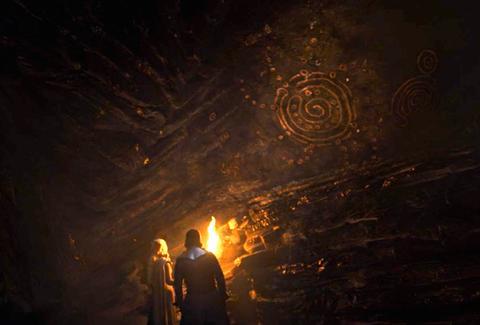
THE SPIRAL
The White Walkers are in many respects a mysterious and somewhat frustrating enemy in Game of Thrones. They never speak but they do have some form of intellect since they create grisly patterns out of severed body parts: 1) a bisected circle and 2) a spiral. Both symbols originated with the creators of the WW, the Children of the Forest - and the spiral in particular is associated with the creation of the Night King since the tree where he was created was surrounded by a spiral created out of standing stones.

It is still unclear what the spiral signified for the Children of the Forest - but in an interview in The New York Post, Dave Hill, one of the writers on the show, explains that the Night King has adopted the symbol as a way to mock his creators:

The question is: has the meaning changed through this appropriation? That is at present not possible to answer since we have no idea what the symbol originally meant to the Children of the Forest. However, I do think that we can attempt to figure out what the Night King means when his people re-create the spiral through dismembered human and animal bodies. Because these spirals are a message, in a sense, and he’s saying “I am coming for you” while at the same time making a mockery of something that was sacred to his creators.
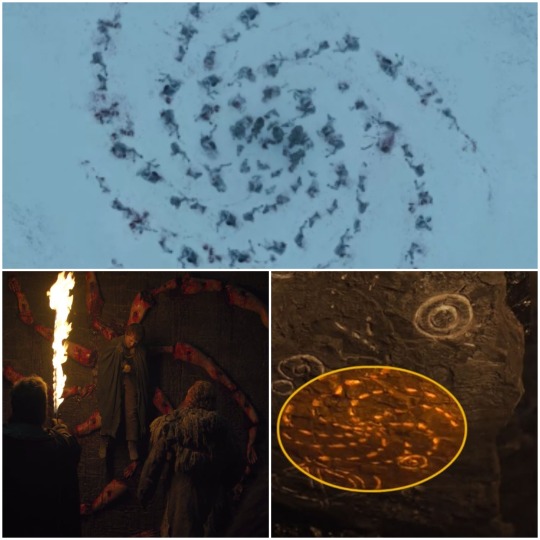
This spiral looks a lot like a wheel without a rim, endlessly spinning around and around. This is rather interesting since Daenerys Targaryen repeatedly talks about “breaking the wheel” in relation to her political ambition of conquering Westeros (I’ll return to this subject later). If the spiral is a spinning wheel, then what does it mean? The image of poor little Ned Umber at the center of a spiral made of severed human limbs in the first episode of season 8 inspired Professor Tyler Dean to write a very interesting opinion piece on the website of the publishing house Tor, which specializes in science fiction and fantasy:
The Mexica believed that time was a spiral. Not a circle, where everything that happened previously was destined to happen again, identical, ad inifinitum. Not linear, where the way forward was uncharted and momentum, progress, and change ruled the day. But, as author/illustrator James Gurney once pointed out to my eight-year-old brain, a combination of the two: a spiral. The forces of history push us ever forwards, but events rhyme with one another—parallel but not identical. That was what I couldn’t get out of my head after watching “Winterfell,” the final season premiere of Game of Thrones.
...
Spiral time is uncanny. We are reminded of familiar events and sequences but they are spiked with the creeping dread that they are not quite what we think or expect them to be.
...
We might be tempted to think of spirals as orderly and predictable, but “Winterfell” reinforces the idea that time in Westeros is not organized in a tightly-bound pattern but a widening gyre: each revolution around the center may echo previous events, but it brings its own entropy and decay. (Tor.com)
This idea of time as a spiral is a very interesting one but what I find especially compelling is this notion of the spiral being connected to an idea of entropy and decay. Tyler goes on to quote The Second Coming, a famous poem by W.B. Yeats:
Things fall apart; the centre cannot hold; Mere anarchy is loosed upon the world, The blood-dimmed tide is loosed, and everywhere The ceremony of innocence is drowned
THE STORM
The notion of decay in relation to the spiral set off various chains of association for me - about how the Night King and the White Walkers are an inhuman and unrelenting force of destruction, in that sense that they come close to be the magical equivalent to a destructive force of nature. The NK is even described as such by Jon Snow who says that he is the Storm. That made me connect the spiral with images of storm systems as they look from space.
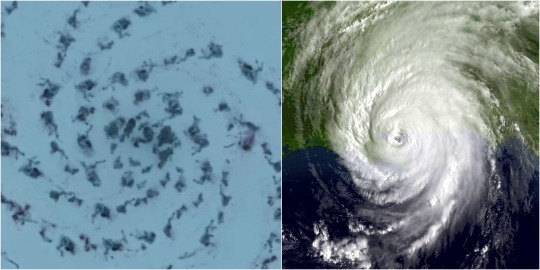
On the right we have a picture of a spiral that the WW made from dismembered horses after they defeated the Night’s Watch at The Fist of the First Men in season 2. The picture to the left is a satellite image of a hurricane. The visual resemblance is very close indeed.
In the first episode of season 8, the spiral was reintroduced when Tormund, Beric and the remainder of the Night’s Watch come upon what remains of the Umber seat, The Last Hearth, after it has been run over by the WW.

When it turns out that poor little Ned Umber has become a zombie, Tormund and friends set fire to him and the body parts that make up the spiral. This is the first time that we’ve seen the spiral associated with the element of fire. This has led people to note a certain resemblance between the spiral and the style in which the Targaryen sigil is rendered.
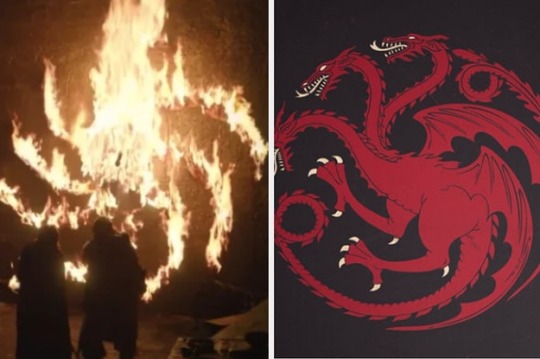
There is indeed a bit of a likeness - and it is worth noting that the Targaryen sigil and the spirals that the WW each have seven arms.
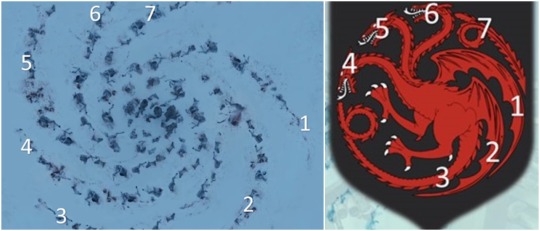
(source)
Is this resemblance merely a coincidence or is there a deeper meaning at work? It is hard to tell but I want to explore this connection a bit further because the sole known Targaryen of this story is, in fact, also visually connected to the spiral symbol. In season 4, Daenerys Targaryen wears a dress made from laser-cut fabric that sports a repeated spiral pattern.
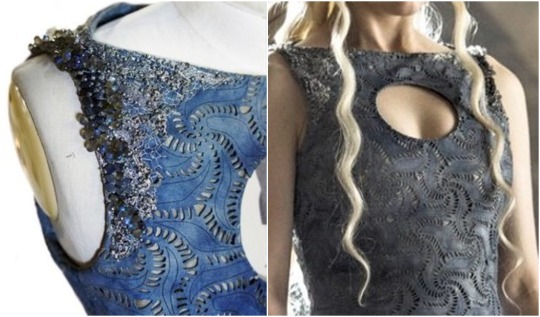
She is also known as the Stormborn because she came into the world during the worst storm that Westeros had seen in living memory. She is also a very war-like character and it is worth remembering that in the books “storm” is often used as a synonym for for “war”. With a bit of squinting one can even perceive s spiral shape hidden in one of the final images of the season 3 finale where Daenerys is lifted up by the freed slaves of Meereen.

It is faint but you could make an argument that it is there. This connection between Daenerys and the Night King is enhanced by the larger thematic framework of GRRM’s story. They are both associated with the extremes of Ice and Fire - indeed, just like the dragons are Fire Made Flesh, so are the White Walkers Ice made Flesh, which I have examined elsewhere.
THE WHEEL
The spiral also somewhat resembles a wheel, as I’ve previously mentioned. I’m not the only person who has noted this resemblance, @lady-griffin mentions this resemblance in this post. In the later seasons, Daenerys Targaryen has become known for wanting to “break the wheel” - but what does that mean?

In season 5 she tells Tyrion Lannister that she’ll have the support of the common people in Westeros and she describes the feudal system as a wheel with spokes made up of the noble Houses. In this context, it seems as though she wants to destroy the feudal system of the country she wants to conquer. However, as she herself mentions, her own House is part of this system and she’s not intending to create a radically new system since she still wants to be Queen. She still wants to occupy the hub of the wheel, i.e. the Iron Throne. She simply wants to remove anyone who can be a threat to her power. What she wants is not a more democratic system but an absolute monarchy with her at the top.
Nebulous and contradictory plans is very typical of Dany’s political rhetoric but I’m rather interested in how she describes this system:
“Lannister, Targaryen, Baratheon, Stark, Tyrell. They’re all just spokes on a wheel. This one’s on top, then that one’s on top. And on and on it spins, crushing those on the ground.”
This conjures a specific concept of Classical (and later Medieval) thought: the Rota Fortuna, or Fortune’s Wheel:
In medieval and ancient philosophy the Wheel of Fortune, or Rota Fortunae, is a symbol of the capricious nature of Fate. The wheel belongs to the goddess Fortuna (Greek equivalent Tyche) who spins it at random, changing the positions of those on the wheel: some suffer great misfortune, others gain windfalls. Fortune appears on all paintings as a woman, sometimes blindfolded, "puppeteering" a wheel. (Wikipedia)

Interestingly, the show invokes Fortune’s Wheel visually in the opening credits. Thus, the Rota Fortuna embodies the political game that dominates the show. Fortune’s Wheel is the very embodiment of the Game of Thrones!
The thing about Fortune’s Wheel is that it never stops spinning. The same goes for the political game - there will always be someone who seeks power, regardless of whether there is a throne or not. The games of power and influence exist wherever human society exist regardless of what kind of government they have - there will always be politics and power plays. The only way to truly stop the spinning of the wheel is to eradicate humankind. There can be no game if there are no players.
This leads me back to the what the spiral may have meant for the Children of the Forest. The NK has adopted this symbol as an act of mockery - it signifies blasphemy on his part according to show writer Dave Hill. In this context, it is important to note that the WW always create this spiral symbol out of dismembered bodies - it is made of dead things and, in a way, the spiral as it is made by the WW symbolizes Death. If the WW’s spiral is an image of Death and it represents an act of blasphemy on the part of the NK, then it is very possible that the spiral signified Life for the CotF - symbolizing that Life spins ever onward through nature.
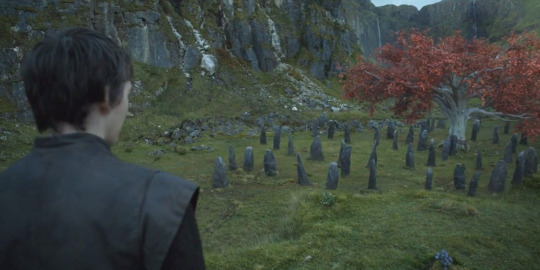
They created the NK by killing and magically re-animating a human man. The original blasphemy was theirs - and there’s a certain symmetry to the fact that the weapon they created by polluting their own magic turned against them. On a final note I also wish to point out that the Weirwood tree where the CotF created the NK is now dead!

This is actually a very important detail because in ASoIaF lore, weirwood trees are practically immortal. They don’t wither and die - unless they are interfered with.
#game of thrones#spiral#symbols#the night king#the children of the forest#the white walkers#daenerys targaryen
179 notes
·
View notes
Text
Will Jon Snow be the Downfall of Daenerys?
Much has been made of the alliance of Jon and Daenerys on Game of Thrones. From a long term perspective, the two coming together was years in the making. For six seasons, the audience followed their somewhat parallel journeys as they rose to power: Daenerys as a conqueror who has always had her eye on Westeros, and Jon as a reluctant leader who is given power through more democratic means. From the earliest episodes of the show, the two are singled out as being special and even marked by destiny. We see that both are touched by their world’s magic as Jon fortuitously rescues six Direwolf pups and Daenerys makes a blood sacrifice in order to hatch three baby dragons into the cosmos.
Jon and Dany have made a political and sexual alliance on the show, but also are secretly bound by a blood tie which will soon be revealed. In light of their recent physical attachment, the revelation of Jon’s true parentage has potentially tragic implications for their relationship. There has been speculation and debate about why Jon Snow bent the knee to Daenerys at the end of season 7. Over the course of this season, it became clear that Dany had become infatuated with Jon; and this, combined with her encounter with the Army of the Dead fueled her pledge to fight with him. Jon then verbally pledges himself (and the North) to Dany. It is not entirely clear why he did this, but the plot has foreshadowed that Northerners and the Stark family will not be accepting of Jon’s actions.
For Daenerys, a romantic union or marriage to Jon Snow has many positive ramifications which may be lulling the audience into anticipating a fairy-tale ending. Beyond the obvious political benefits, Jon Snow is a potentially good partner for Dany. In her past marriage to Khal Drogo, even though the two eventually came to love each other, Dany had to endure many indignities. As a very young woman, she was used by her brother as a political pawn and then raped on her wedding day. Although Drogo developed a softer side with respect to Dany, he was not an ethically enlightened person. The Dothraki (including Drogo) are portrayed as primitives whose “masculine” ethos involves pillage and rape in their raw pursuit of power. This is basically what they are all about. Although Dany intervenes with Drogo to stop specific acts of rape, this concession from him indirectly leads to his death. In addition, although Dany is opposed to rape and slavery, she relies on brutal tactics of her own when she burns the Khals. It is through this display of raw power and supernatural “fire-proofness” that she gains the support of the Dothraki. Her triumph does not happen because the Dothraki have suddenly become politically enlightened.

In any case, Jon Snow as a partner for Dany is ostensibly an advance over Khal Drogo. Although Jon is very competent, even exceptional, in the masculine art of “fighting” he has never pursued power for it’s own sake. In emotionally charged situations where he has been compelled by circumstances to take a life, he often did so reluctantly, and sometimes not at all. He also has expressed doubts to others about the lives that he has taken. In some sense this “tortured soul” quality even seems to be what Dany finds attractive about him, as when Jon gives her pause by admitting that he doesn’t enjoy the things that he is good at. While Drogo was no doubt operating within the Dothraki code of honor, his world view was primitive compared to Jon’s more sophisticated conscience.
Although Dany appears to be a champion of the downtrodden, most of those who have pledged loyalty to her have done so because they had no other choice. The unsullied were conditioned to obey whoever held the whip. Even though Dany dropped the whip and allowed them certain freedoms, they really had nowhere else to go. Likewise, the Dothrhaki were conditioned to follow whomever was able to kill other Khals. Dany got her Dothrakis by effecting a mass burning of the leadership in their holy city and also by a raw display of God-like power. Even though Dany seems better because she is against slavery and rape, her followers never appear to question her quest for world domination and the means that will be required to achieve it. Her means in and of themselves are not very different from what any other leaders have done. Although Dany is inspirational in her reputation as a “liberator” she is still authoritarian in her desire for domination, which mostly seems to be based upon the Targaryen name and Dragon-power.
The coming together of Jon and Dany is setting us up for a clash of world views as well as armies. In many ways, Jon’s world view is the antithesis of Dany’s. Dany’s route to power on Game of Thrones has been “positive” in that she has actively sought her acquisition of armies and wealth to fuel her conquest of Westeros. She is very comfortable in the role of receiving obeisance from others since this is all wrapped up in her sense of destiny as The Last Targaryen. She feels that it is all her birthright. On the other hand, Jon Snow’s journey to power is “negative” in the sense that he has not sought it for himself. His personal qualities have motivated those around him to select him for leadership. After he is resurrected, instead of viewing himself as being destined for something important (as Melisandre hints), his plan is to anonymously head South. It is only because Sansa arrives at Castle Black and convinces him to attempt to take Winterfell that he even becomes King in the North. So Jon is a person who uses his conscience to do the best that he can when others place their trust in him. Rather than pursuing power, he tries to do what is right for its own sake. Although it appears on the surface that Jon and Dany’s paths are complementary, they are actually in conflict.

After Dany destroys a large part of the Lannister forces and burns the Tarlys for refusing to bend the knee to her, she returns to Dragonstone and asks Jon Snow how many men his army killed when he took back Winterfell as if to imply equivalence. Except that the two situations are not really equivalent. The quest of Sansa and Jon to regain Winterfell had a moral dimension that is absent from Dany’s conquest of Westeros. Dany’s notion of “helping people from a position of strength” really rests on little more than the sense of entitlement she derives from her name and her dragons. There is no foundation of moral “rightness”, but rather a cult of personality backing her. Her followers, after all, are composed primarily of armies of brutally subjugated slaves and tribally minded “bloodriders”. She really has not proven herself to be worthy of support in Westeros, but is a foreign invader.
In his relationship with Ygritte and even with Dany, Jon Snow has been portrayed as an object of affection for a more active woman. Ygritte made the initial advances in her relationship with Jon, and Dany is shown being more actively interested in Jon than he is in her. The interesting part of this is that Dany is actually waylaid from her conquest of Westeros because of her attraction to Jon Snow. She loses Viserion because she goes beyond The Wall to rescue Jon, and she unknowingly buys Cersei more time by attempting to enter into a truce with her. Dany may be risking everything she has been working towards for love and it could lead to her downfall. Although Jon is certainly on dangerous ground by forming an alliance with Dany, this is also true for her.
How could her downfall happen? One wild card will be how Jon’s reaction to finding out about his true ancestry will affect their relationship. Another is the reaction of the people around Jon and Dany to the truth about Jon. Tyron and Varys have expressed reservations about Dany’s execution of the Tarlys and it seems likely that this situation is going to come to a head early in Season 8, as Jon and Daenerys come into contact with Samwell Tarly at Winterfell. It may be a catalyst for a serious rift in their relationship and is also fertile ground for their clashing world views to play out with very dramatic consequences. If she breaks with Jon and/or circumstances force her to retreat back to Dragonstone, her armies will still be vulnerable to attack from Cersei, and Dany would be seriously weakened and vulnerable.
For the general audience, Jon and Daenerys are the protagonists of Game of Thrones; they are the “good guys.” Exactly how the show will portray a rift between the two will be fascinating. Many have speculated that Westeros is headed for the abolishment of the Iron Throne as somehow ushered in by Jon Snow, the new Aegon. The character development of both Jon and Dany, with their “negative” and “positive” paths to the conclusion of the series is one way of looking at where the plot will go. A victory by Daenerys is not really very groundbreaking, whereas the ascension of Jon (or at least his ethos) would actually represent a step forward for the seven kingdoms.
47 notes
·
View notes
Photo
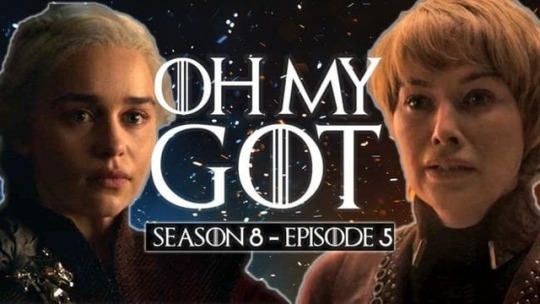
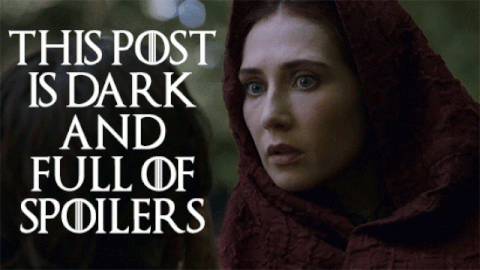
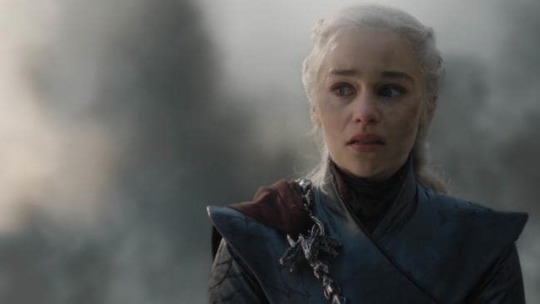
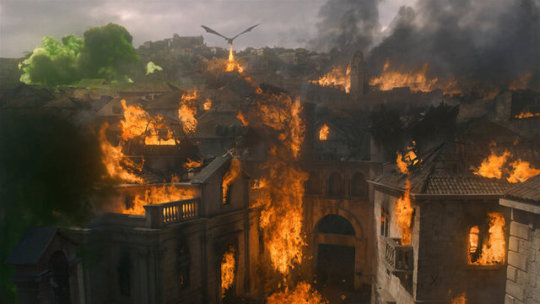
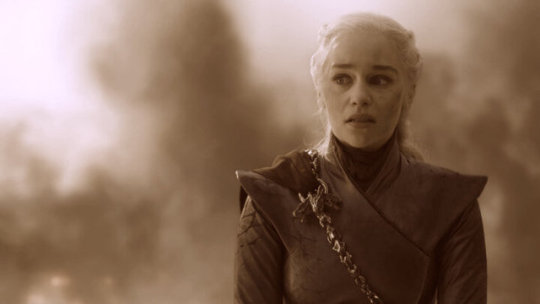
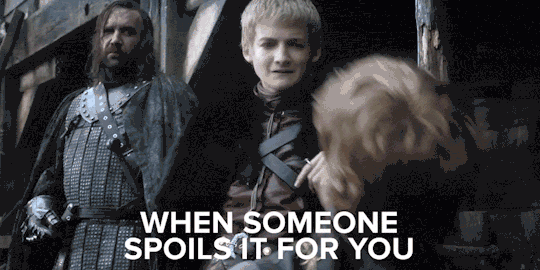
‘Game Of Thrones’ Built Up Its Female Characters Just To Watch Them Fall
The women we championed for nearly a decade suffered confusing character shifts in the final season.
By Leigh Blickley 05/14/2019
Bells continuously chime as Daenerys Targaryen (Emilia Clarke), sitting atop her fire-breathing dragon Drogon, stares out at King’s Landing. She’s enraged, having recently watched Queen Cersei Lannister (Lena Headey) order the execution of her best friend, Missandei (Nathalie Emmanuel), shortly after her dragon-child Rhaegal was speared to death.
Before facing those losses, Dany fought the army of the dead, held her adviser Jorah Mormont (Iain Glen) as he took his last breath and discovered that her new love, Jon Snow (Kit Harington), was actually her nephew, the true heir to the Iron Throne. At this particular moment, she’s unhinged. And bells are ringing. And ringing, and ringing.
With the Red Keep in sight, Dany snarls as she decides to forgo everything she’s become in favor of an old Targaryen tactic: “Burn them all.” She goes full villain in the penultimate episode of “Game of Thrones,” scorching enemies and innocents alike as she surrenders to madness.
Yet many viewers saw little forewarning that a character twist of this magnitude was coming, and her erratic change of heart was a punch to the gut. Instead of the satisfying conclusion of a long descent to depravity, Dany suddenly shifts modes, from a woman who graciously earned loyalty over seven seasons to a power-hungry monster who murders thousands of men, women and children.
Sure, she wasn’t always perfect, but the Daenerys Targaryen we knew was the fearless Mother of Dragons. She was Khaleesi, who united the Dothraki after the death of Khal Drogo (Jason Momoa), later rallying them to fight for her claim to the Seven Kingdoms. She was Mhysa, who freed the Unsullied and was lifted up by the slaves of Mereen. Dany rose from the ashes to break chains and then risked everything to protect Jon and the North from the Night King’s army.
To see a woman so fully represented over 70 hours of television, especially in a fantasy epic, was groundbreaking. But, with a final season of just six episodes, showrunners David Benioff and Dan Weiss decided that a couple of scenes were enough to turn the unburnt beauty bad ― and essentially muddied her yearslong journey.
The “Game of Thrones” audience had devoted so much time to Dany, and other characters, only to now watch Benioff and Weiss hurry along the ending (and move on to their “Star Wars” trilogy). Why couldn’t they, after spending nearly two years crafting the final season, show us Dany’s slow decline into madness? Why do we have to watch “Inside the Episode” to figure it all out?
Surely George R.R. Martin, who wrote the unfinished “Song of Ice and Fire” book series on which the HBO show is based, told Benioff and Weiss where he wanted the storyline to go: “Mad Queen” Dany destroys King’s Landing, demonstrating that humanity, not necessarily the dead, is the true enemy. The thing is, the showrunners decided to shorten the final two seasons of “Game of Thrones,” to seven and six episodes respectively, and rush through key plot points to reach Martin’s goal. And it’s turned into a bit of a nonsensical mess.
Sure, make Dany evil ― women can be monsters, too. We’ve certainly seen glimpses of her “madness” in the past, whether it be callously watching as her brother Viserys (Harry Lloyd) is killed by Khal Drogo in Season 1 or perhaps prematurely burning alive the father and brother of Samwell Tarly (John Bradley) in Season 7.
But whereas, lately, the show tells us what to think, the books present Dany’s inner monologue. Readers can see how she fights to shake her violent family history as not only her actions but her wide-ranging relationships with siblings, friends and lovers are described.
From “A Storm of Swords”:
“I was alone for a long time, Jorah. All alone but for my brother. I was such a small scared thing. Viserys should have protected me, but instead he hurt me and scared me worse. He shouldn’t have done that. He wasn’t just my brother, he was my king. Why do the gods make kings and queens, if not to protect the ones who can’t protect themselves?”
“Some kings make themselves. Robert did.”
“He was no true king,” Dany said scornfully. “He did no justice. Justice ... that’s what kings are for.”
Ser Jorah had no answer. He only smiled, and touched her hair, so lightly. It was enough.
Although “Game of Thrones” used to give us more context around characters and their decision-making, once it passed the books’ timeline in Season 6, the series faltered a bit in terms of depth. It didn’t show us the intricacies of Dany’s small council, her romance with Jon or her friendship with Missandei, who is only a young girl in Martin’s novels. Perhaps if we saw the show’s version of Dany and Missandei have a meaningful conversation about fear or loneliness ― versus men and sex ― we would have understood Dany’s underlying fragility and why Missandei’s murder triggered a rage within her. Instead, we saw the one woman of color become a plot device to turn Dany, as well as her own lover Grey Worm (Jacob Anderson), to the dark side.
That’s all to say that the recent rushed storylines have prevented us from getting that nuance we previously used to connect the dots.
The same flaw also hurts other women on “Game of Thrones,” including Cersei, Brienne of Tarth (Gwendoline Christie) and Arya Stark (Maisie Williams).
Brienne is one of the strongest warriors in Westeros. She killed Stannis Baratheon (Stephen Dillane) and took down the 6-foot-6 Hound (Rory McCann) ― with a few solid punches, might we add. Yet she turned into a puddle of mush when Jaime Lannister (Nikolaj Coster-Waldau) left her for Cersei ― something she would’ve never done three seasons ago. In one sense, it’s wonderful to see a vulnerable woman on screen. But Brienne ― who is rarely shown out of armor ― sobbing in a nightgown came out of left field. (Love makes us do crazy things?)
And Cersei was so shocked and afraid to meet her rubbly end during Episode 5, Season 8, that it’s easy to forget she once told Ned Stark (Sean Bean): “In the game of thrones, you win or you die.” The ruthless Cersei we’ve studied over eight seasons, the most cunning of the cunning, would’ve known to flee the city when she saw dragon fire (especially if she wanted to protect her unborn child). Or she would’ve at least had another plan in case those scorpion artillery weapons didn’t work out.
We’re not watching the most adventurous show in the world for uninventive writing. Yet here we are.
During the most recent episode, The Hound easily convinces Arya to go home and forget about killing Cersei. She hugs him goodbye, gives up on Cersei and tries to make it safely out of King’s Landing.
Eh, what? We’ve watched Arya train for years to become an assassin. She just destroyed the Night King with a stab of a dagger! She doesn’t fear death! She just traveled weeks to get to the capital for one sole purpose: to murder the woman who betrayed her family.
Too-fast, terribly thought-out writing has reduced “Game of Thrones” to a soap opera. We miss the scenes where Dany argues the advice of Ser Barristan Selmy (Ian McElhinney). Or when Arya secretly soaks up intel from Tywin Lannister (Charles Dance). Or how about when Sansa Stark feeds her abusive husband Ramsay (Iwan Rheon) to his own hounds?
Now we see a half-baked “Mad Queen” and a woman like Sansa crediting sexual violence, not her own strength, for making her a power player in Westeros.
THE HOUND: None of it would’ve happened if you left King’s Landing with me. No Littlefinger. No Ramsay. None of it.
SANSA: Without Littlefinger and Ramsay, and the rest, I would’ve stayed a little bird all my life.
It’s that bad.
Riddle me this: Why does a show featuring four leading ladies have barely any female writers? (Bonus: Michelle MacLaren was the only female director brought on to helm episodes, the last of which aired in 2014.) Although Gursimran Sandhu is credited as a staff writer for Season 8 on IMDb, only two other women, Jane Espenson and Vanessa Taylor, wrote for the series, with both of their runs ending by 2013. That, my little birds, is the root of a very big, now unfixable problem.
Espenson helped craft scenes like the aforementioned death of Viserys, and Taylor had a say in that memorable lunch between Sansa, Margaery (Natalie Dormer) and Olenna (Diana Rigg) as well as Arya and The Hound’s Brotherhood Without Banners meetup. Those back-and-forths soar in comparison to Season 8’s Sansa-Dany stares or Cersei’s unexplained cowardice.
Clearly, Sandhu couldn’t have singlehandedly saved the final season, but other women’s voices in the writers’ room might have provided more perspective into these characters’ closing motivations.
Still, Martin created these women, and Benioff and Weiss have shown they can write strong dialogue for them on this show. It just feels like the latter two’s desire to be in a galaxy far, far away perhaps trumped their desire to give these ladies what they deserve: earned arcs.
RELATED COVERAGE
‘Game Of Thrones’ Fans Had A Lot Of Feelings About Daenerys’ Fiery Choice
The ‘Game Of Thrones’ Season 8 Premiere Was Good. But Why Wasn’t It Great?
Why That Daenerys Twist On ‘Game Of Thrones’ Burns So Badly
https://www.huffpost.com/entry/game-of-thrones-women-daenerys-cersei-arya-sansa_n_5cd98811e4b0796a95dfd968
3 notes
·
View notes
Note
How would you LOVE for Game of Thrones to end vs how you would expect it to realistically end?
Sorry I took so long to answer this! I first received it out of town and then got so many more asks that were quick and easy answers. This is one I really wanted to take my time with haha.
Okay, so I would LOVE for Game of Thrones to end in a way that is totally not consistent with its tone thus far so I know this won’t happen. I put this disclaimer here as a filter for the long string of wet blanket anons who love to come into my inbox and tell me all of the problems with my answers even when those answers are meant to be in good fun, and not to be taken seriously–like this one haha.
So in my happy fantasy ending (that we know will never happen, okay?), the WW are dead. Jon and Dany’s season-long relationship has lead to an unexpected (for them at least) pregnancy. Dany has a baby girl. This is not a problem because they are both alive to assert that their daughter will have full rights to inherit any titles they hold upon their death, because if anyone thinks the “men first” inheritance rules are bullshit, it’s Dany. Baby is named Lyanna. Bite me, I love this name and the idea of Jon wanting to name his daughter after the mother he never knew but later learned of.
Speaking of that, Jon comes to terms with his Targaryen roots when he learns of them. At first he feels strange about his familial connection to Dany but his affection for her overcomes any weirdness since as we all know, cousins and other family members often wed in this universe. If anything, their shared blood gives both Jon and Dany a renewed sense of belonging with one another. Jon no longer feels like the cast off or bastard, and Dany takes comfort in the fact that she is not the last dragon after all, and that she and Jon can carry on her family’s special bloodline together.
But Jon is still a Stark at heart, and he is the planner, the pragmatist, and the surly one in the relationship. Dany is still fiery, temperamental, and passionate. But she is even more compassionate and together they are very happy. They get married without frills while they are still in the North, because Jon keeps the Old Gods and I love Northern wedding ceremonies :)
Instead of ruling the 7k as king and queen, they both desire a quieter life after everything they’ve been through. Dany’s main prerogative is to leave the world better than she found it, and she can do that without being queen of the 7k. This makes sense because the Iron Throne both visually and literally is a seat for one, not for a happy, functioning couple. So Dany and Jon take up residence at Dragonstone to raise their family while remaining close enough to King’s Landing to still be involved in the governance of the realm. Dany serves as a representative of sorts who periodically travels to King’s Landing along with other prominent survivors to discuss important business.
Her dothraki are complicated. I suppose they could have a good life in the South, where the landscape isn’t so different from the dothraki sea. They breed the best horses in the realm. The Unsullied stay at Dragonstone as Dany and Jon’s personal guard.
Tyrion travels between King’s Landing and Casterly Rock, and serves in a position something like a prime minister, overseeing and calling the aforementioned meetings of representatives together. He also oversees the people who hold important “small council” style positions. There is still a master of coin, etc, and a bank. Things still have to function. It’s not a utopia. Varys lives in KL as well and is still our favorite gossip and to some extent shares governance with Tyrion as he did in Meereen while Dany was gone.
Jaime stays in King’s Landing with Tyrion, who he managed to reconcile with after Cersei’s death. I’m going to say that Jaime finally wised up and saw Cersei’s role in the deaths of all their children and fulfilled the prophecy by killing her himself. Since I will always see Jaime as a man who loves to fight, he will serve as something between the commander of the City Watch and the commander of what was the Kingsguard, because Tyrion and other government officials will still need protection.
Brienne, whose life’s goal it has been to serve honorably and to serve someone deserving, stays in Winterfell where she protects Sansa, the Lady of Winterfell. Sansa is married to Podrick Payne, and she doesn’t care at all that people reading this are freaking out about how he isn’t enough of a noble and it isn’t an advantageous marriage. Because Sansa always wanted a handsome, gallant knight to sweep her off her feet. And who better than the truly adorable and perfect cinnamon that is Pod? Not to mention the fact that he is canonically sensational in the sack. Sansa deserves a positive romantic relationship for once in her life.
I think it’s difficult to choose for Arya because I want so many different things for her. I am not sure if Arya’s character where she stands now would be happy being rooted in one place, if she really would settle down and stay in Winterfell. I see Arya exploring what is left of the world to explore, doing cool shit and always coming back to visit her beloved big brother/cousin, of course :P She also will have Gendry at her side because I will continue shipping Gendrya from beyond the grave lol. Maybe for added fun The Hound joins them on these adventures. That’s a spinoff I would watch the hell out of.
Bran lives at Winterfell with Sansa. I am also on the fence about Bran’s ending. Does he like being the Three-Eyed Raven when all is said and done? Does he want to have visions in peace time? If not, I like to think he would find reprieve from them at Winterfell with his sister. Maybe he’s married to Meera and they have gorgeous children with curly brown hair. God this is so sickeningly sweet and nothing like GoT hahaha I am so sorry.
Sam finishes his studies at the Citadel and becomes maester at Dragonstone, because there is no longer a Wall and no longer a Night’s Watch. There is nothing to fight off North of The Wall and the Free Folk are now free. Gilly lives with Sam and Little Sam.
The Free Folk have all been given lands in the wide expanse of the North, which has even more room thanks to the catastrophic casualties of the wars we’ve seen through the seasons.
All of these noble houses whose lords are dead are quickly filled with people who were helpful in the war effort, like Davos, Edd, Grey Worm, Missandei (those two are together, of course :P), maybe even Tormund, Theon.
Speaking of Theon, Euron died in some glorious fashion, a battle at sea, and Yara is queen of the Iron Islands, where there is no more raping and reaving, and my beautiful pirates live well, crafting the best ships for travel throughout Planetos.
I’m sure I’m forgetting someone but that’s it for now.
So onto how I think it actually will end.
I think that the war with the WW will be devastating. The Wall will be totally destroyed and there will be a lot of damage to the North. Winterfell will be okay because the Stark’s always endure, etc etc. King’s Landing will be destroyed.
Again, my honest speculation is that all of our faves can’t possibly live until the end. I think that Jon might die during this war. I don’t want that to happen. But I think it will happen. I will be inconsolable for the rest of my life but I am still trying to be logical about it and manage my expectations haha.
If Jon does die in battle, I think he and Dany will have conceived a baby before that happened so that the Targaryen line continues on. As I’ve said before I am not sure the Iron Throne will still be a thing at the end so instead of ruling in KL Dany will be queen at Dragonstone and will raise her child, who will probably be a son.
Since she granted independence to the Iron Islands in the season 6 finale, she will happily let other kingdoms govern themselves if they wish and I imagine whatever is left of Dorne will choose that route, along with the North.
Alternatively, both Jon and Dany live through the battle. But Dany dies in childbirth, and Jon raises their child at Winterfell. These are two very different predictions, I know. But I just don’t know if George or D&D will be nice enough to let both live haha.
I have a feeling that the remaining Starks will live, but that Sansa will be the one to rule Winterfell and possibly serve as Wardeness of the North if such a title still exists, maybe even QitN, which could be cool.
If Arya survives, my prediction for her is kind of similar in my fantasy version and real speculation. I don’t see Arya just marrying some lord and I certainly don’t see her just sitting around serving Sansa at Winterfell. I feel that Arya might continue roaming.
I kind of buy into all the fun theories that Bran really is all of those Bran’s throughout history, or that he at least influences them as the Three-Eyed Raven. So I think that Bran will continue to be the Three-Eyed Raven, watching over everyone and staying rooted wherever he has to to do that.
Tyrion will live and so will Varys and like I said in my fun ending I believe that they will manage the government of the realm, but since I think KL will get destroyed, perhaps they do this from Dragonstone as their headquarters.
I do think that Cersei will die but unlike in my happy fantasy ending I think that Jaime will die too. I hate this but it’s just what I predict. Jaime, especially show!Jaime, seems to base so much of his identity on Cersei that I honestly can’t picture what he would do without her, especially now that all of their children are dead.
I think that a lot of our minor characters that we love will die in the war, too. Probably The Hound. Maybe Tormund. I could see Brienne going out defending Sansa as much as I would hate that. But I know they’re going to tear at our heartstrings a few more times before this is all through.
If Davos lives I believe he will be given a lordship somewhere if Jon is dead. If Jon lives, I see him continuing to be Jon’s own sort of “Hand of the King”/adviser/hype man.
Sam’s story is one that I also see the same in real ending and happy ending. He will finish his studies to be a maester and then serve somewhere, always keeping Gilly with him because “fuck the system” Sam is a thing and I am 100% here for it.
Theon will die fighting but it will be okay because he can never be the man he was before Ramsay got to him anyway. Euron will eventually be killed but not before wreaking a fuck ton of havoc. He probably kills Theon. Yara gets to rule the Iron Islands but it is not easy and she faces a lot of resistance as their first female ruler.
If Gendry lives he could possibly be legitimized and be lord of Storm’s End. I would dig that.
I have no idea what to say about the Sand Snakes. No idea.
Drogon and Rhaegal will be the last dragons because their power is too much for any one person to have. Dragons returned to the world with Dany because she uses them for good to fight the WW. But they, and many other traces of magic, will die out from the realm at the close of our story.
If I’m being realistic I’m sure that Essos will to some extent return to its former lawlessness, but I doubt slavery will ever truly take root their again, especially around the Bay of Dragons :)
Anyway, I wish this was more detailed but I am tired and this answer is already insanely long. I hope it is at least of some interest to you, anon!
2 notes
·
View notes